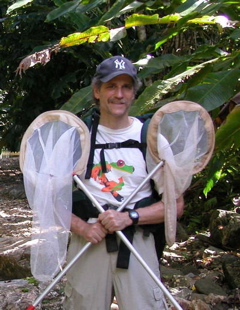DAVID N. REZNICK

Professor of Biology Office 3346 Spieth Hall E-mail: Degree: UCR Appointment : |
Research |
|
I study the process of evolution using an experimental approach in natural populations. I have primarily worked on the evolution of life histories in natural populations of guppies from the island of Trinidad, where I compare populations that differ in their risk of death due to predation. I have coupled this natural system with theory that predicts how life histories should evolve in response to changes in mortality rate. I have evaluated the evolution of all features of the life history, from birth to death. I have manipulated the risk of mortality in nature by treating streams like giant test tubes. Waterfalls often punctuate the distributions of guppies and predators. I have been able ot reduce risk of predation by transplanting guppies from high predation sites below waterfalls to previously guppy-free low predation sites above them. I have also increased risk of mortality by introducing predators over waterfalls that previously excluded them but not guppies. These experiments provided the first experimental test of some aspect of evolutionary theory in nature plus enabled me to estimate the rate of evolution in an episode of directional selection. It is considerably faster than previously imagined. My work has proven relevant to other fields, including the study of aging, fisheries management, and conservation biology. I am currently extending this work as PI of a multi-investigator project funded by the FIBR program at NSF in which I and my colleagues are using new, replicate introduction experiments to study the interaction between evolutionary and ecological processes. I am also studying the evolution of placentas in the guppy family (Poeciliidae) and am using this as a model system for studying the evolution of complex traits. |